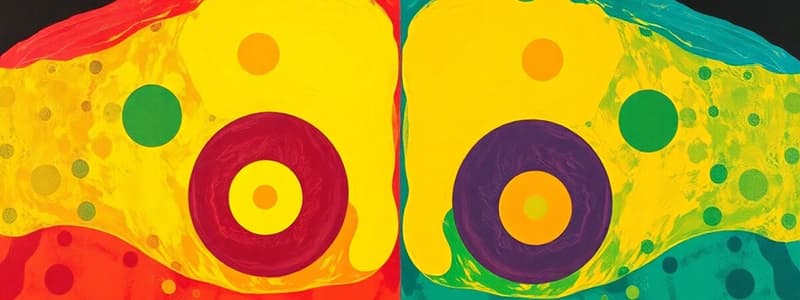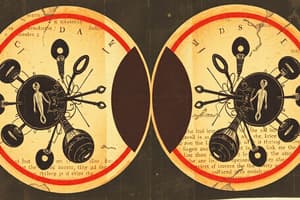Podcast
Questions and Answers
In which type of cell does mitosis occur?
In which type of cell does mitosis occur?
- gametes
- haploid cells
- sperm cells
- none of the above (correct)
The normal number of chromosomes in a human body cell is:
The normal number of chromosomes in a human body cell is:
46
Mom and Dad each have ______ chromosomes in their cells.
Mom and Dad each have ______ chromosomes in their cells.
46
When reproduction ______ occurs, gametes are formed.
When reproduction ______ occurs, gametes are formed.
These cells have ______ chromosomes each.
These cells have ______ chromosomes each.
When these cells rejoin, we call it ______.
When these cells rejoin, we call it ______.
The new cell now has ______ chromosomes again.
The new cell now has ______ chromosomes again.
The cell starts to make copies of itself, which is called ______.
The cell starts to make copies of itself, which is called ______.
Which pigment in plants is responsible for capturing light energy?
Which pigment in plants is responsible for capturing light energy?
XY indicates a [blank], while XX indicates a [blank].
XY indicates a [blank], while XX indicates a [blank].
Place these six steps of Mitosis in order:
Place these six steps of Mitosis in order:
Identify each diagram as either Mitosis or Meiosis:
Identify each diagram as either Mitosis or Meiosis:
Occurs in somatic cells.
Occurs in somatic cells.
Produces gametes.
Produces gametes.
Ends with four cells being produced.
Ends with four cells being produced.
Uses spindle fibers to pull apart chromatids.
Uses spindle fibers to pull apart chromatids.
The new cells are haploid.
The new cells are haploid.
Crossing over occurs in this process.
Crossing over occurs in this process.
How your toe will heal if damaged.
How your toe will heal if damaged.
Produces 2 daughter cells.
Produces 2 daughter cells.
Undergoes PMAT (meiosis occurs 2 + mitosis occurs 1).
Undergoes PMAT (meiosis occurs 2 + mitosis occurs 1).
Cytokinesis separates cells in this process.
Cytokinesis separates cells in this process.
Provides genetically diverse cells.
Provides genetically diverse cells.
What structure(s) allows chromosomes to separate and move during mitosis?
What structure(s) allows chromosomes to separate and move during mitosis?
What do we call the long coiled strands of DNA inside the nucleus?
What do we call the long coiled strands of DNA inside the nucleus?
During what process can crossing over occur?
During what process can crossing over occur?
What kind of cells most likely result from uncontrolled growth due to mutations in genes that control the cell cycle?
What kind of cells most likely result from uncontrolled growth due to mutations in genes that control the cell cycle?
At what point in the cycle does DNA replication occur?
At what point in the cycle does DNA replication occur?
Acidic solutions have a pH between [blank] and [blank].
Acidic solutions have a pH between [blank] and [blank].
DNA and RNA are built from chains of chemicals called:
DNA and RNA are built from chains of chemicals called:
The building blocks of proteins are called:
The building blocks of proteins are called:
Electrons have a [blank] charge.
Electrons have a [blank] charge.
Which parts of the atom are found in the nucleus?
Which parts of the atom are found in the nucleus?
A kind of lipid that stores energy:
A kind of lipid that stores energy:
What is an ion?
What is an ion?
The monomers of lipids are known as [blank].
The monomers of lipids are known as [blank].
The movement of particles from an area of high concentration to an area of lower concentration is known as [blank].
The movement of particles from an area of high concentration to an area of lower concentration is known as [blank].
The job of DNA and RNA is to:
The job of DNA and RNA is to:
DNA polymerase is used inside the nucleus to unzip DNA to be read by mRNA. What type of molecule is DNA polymerase?
DNA polymerase is used inside the nucleus to unzip DNA to be read by mRNA. What type of molecule is DNA polymerase?
What is a primary use for carbohydrates in the body?
What is a primary use for carbohydrates in the body?
All life that has ever been discovered is formed form long chains of [blank] bonded together with other elements.
All life that has ever been discovered is formed form long chains of [blank] bonded together with other elements.
The net overall charge of an oxygen atom is [blank].
The net overall charge of an oxygen atom is [blank].
Cellulose helps to compose the cell walls of plants, and is not easily digested in the human body. What type of molecule is cellulose?
Cellulose helps to compose the cell walls of plants, and is not easily digested in the human body. What type of molecule is cellulose?
What do enzymes help to do?
What do enzymes help to do?
Osmosis is the movement of water from a high concentration to a lower concentration across a [blank] membrane.
Osmosis is the movement of water from a high concentration to a lower concentration across a [blank] membrane.
Protons have a [blank] charge and are found in the [blank] of an atom.
Protons have a [blank] charge and are found in the [blank] of an atom.
Who was the first person to call a cell a cell?
Who was the first person to call a cell a cell?
What did he name them after?
What did he name them after?
Who determined that all plants were made of cells?
Who determined that all plants were made of cells?
Who discovered that all animals were made of cells?
Who discovered that all animals were made of cells?
Give 3 real world examples of how to increase the rate of diffusion in a solution:
Give 3 real world examples of how to increase the rate of diffusion in a solution:
Which of the following organelles are present in prokaryotes but not eukaryotes?
Which of the following organelles are present in prokaryotes but not eukaryotes?
Which of the following conclusions could you draw about the cell shown in Figure 7-1?
Which of the following conclusions could you draw about the cell shown in Figure 7-1?
What part of the cork cell was Robert Hooke looking at under the microscope?
What part of the cork cell was Robert Hooke looking at under the microscope?
Which type of organism is theorized to inhabit the planet first?
Which type of organism is theorized to inhabit the planet first?
Who is credited with inventing the compound light microscope?
Who is credited with inventing the compound light microscope?
Draw the phospholipid bilayer (as best you can) and label which part is hydrophilic and hydrophobic, and tell me where the cholesterol is located.
Draw the phospholipid bilayer (as best you can) and label which part is hydrophilic and hydrophobic, and tell me where the cholesterol is located.
Use the following word bank to label the cells below (Hint: you will not use all of them, and you only have to label the boxes).
Use the following word bank to label the cells below (Hint: you will not use all of them, and you only have to label the boxes).
Where are the 2 places in the cell you could find ribosomes?
Where are the 2 places in the cell you could find ribosomes?
Name one similarity and one difference of a mitochondria and a chloroplast.
Name one similarity and one difference of a mitochondria and a chloroplast.
If the first cells found on Earth were similar to prokaryotes, describe them.
If the first cells found on Earth were similar to prokaryotes, describe them.
List the 3 postulates of the Cell Theory.
List the 3 postulates of the Cell Theory.
What is a vesicle?
What is a vesicle?
Both [blank] make energy, only chloroplast is found in [blank].
Both [blank] make energy, only chloroplast is found in [blank].
Put the correct letter to the matching term on the right.
Put the correct letter to the matching term on the right.
Flashcards
Mitosis
Mitosis
The process of cell division that produces two genetically identical daughter cells.
Meiosis
Meiosis
The process of cell division that produces four genetically unique daughter cells, each with half the number of chromosomes as the parent cell.
Diploid Cell
Diploid Cell
A type of cell that contains two sets of chromosomes (2n).
Haploid Cell
Haploid Cell
Signup and view all the flashcards
Fertilization
Fertilization
Signup and view all the flashcards
Gamete
Gamete
Signup and view all the flashcards
Chlorophyll
Chlorophyll
Signup and view all the flashcards
Cellular Respiration
Cellular Respiration
Signup and view all the flashcards
ATP (Adenosine Triphosphate)
ATP (Adenosine Triphosphate)
Signup and view all the flashcards
Chromosome
Chromosome
Signup and view all the flashcards
DNA Replication
DNA Replication
Signup and view all the flashcards
S Phase
S Phase
Signup and view all the flashcards
Spindle Fiber
Spindle Fiber
Signup and view all the flashcards
Cytokinesis
Cytokinesis
Signup and view all the flashcards
Prophase
Prophase
Signup and view all the flashcards
Metaphase
Metaphase
Signup and view all the flashcards
Anaphase
Anaphase
Signup and view all the flashcards
Telophase
Telophase
Signup and view all the flashcards
Crossing Over
Crossing Over
Signup and view all the flashcards
Cancer Cell
Cancer Cell
Signup and view all the flashcards
Acidic Solution
Acidic Solution
Signup and view all the flashcards
Nucleotide
Nucleotide
Signup and view all the flashcards
Amino Acid
Amino Acid
Signup and view all the flashcards
Diffusion
Diffusion
Signup and view all the flashcards
Fat
Fat
Signup and view all the flashcards
Carbohydrate
Carbohydrate
Signup and view all the flashcards
Nucleus
Nucleus
Signup and view all the flashcards
Enzyme
Enzyme
Signup and view all the flashcards
Photosynthesis
Photosynthesis
Signup and view all the flashcards
Cell Wall
Cell Wall
Signup and view all the flashcards
Nucleus
Nucleus
Signup and view all the flashcards
Cell Membrane
Cell Membrane
Signup and view all the flashcards
Cytoplasm
Cytoplasm
Signup and view all the flashcards
Ribosome
Ribosome
Signup and view all the flashcards
Endoplasmic Reticulum (ER)
Endoplasmic Reticulum (ER)
Signup and view all the flashcards
Golgi Apparatus
Golgi Apparatus
Signup and view all the flashcards
Mitochondria
Mitochondria
Signup and view all the flashcards
Lysosome
Lysosome
Signup and view all the flashcards
Chloroplast
Chloroplast
Signup and view all the flashcards
Vacuole
Vacuole
Signup and view all the flashcards
Cilia
Cilia
Signup and view all the flashcards
Flagella
Flagella
Signup and view all the flashcards
Nucleoid
Nucleoid
Signup and view all the flashcards
Nucleolus
Nucleolus
Signup and view all the flashcards
Nuclear Pores
Nuclear Pores
Signup and view all the flashcards
Nuclear Envelope
Nuclear Envelope
Signup and view all the flashcards
Cytoskeleton
Cytoskeleton
Signup and view all the flashcards
Microfilaments
Microfilaments
Signup and view all the flashcards
Microtubules
Microtubules
Signup and view all the flashcards
Thylakoid
Thylakoid
Signup and view all the flashcards
Grana
Grana
Signup and view all the flashcards
Gregor Mendel
Gregor Mendel
Signup and view all the flashcards
Genotype
Genotype
Signup and view all the flashcards
Phenotype
Phenotype
Signup and view all the flashcards
Allele
Allele
Signup and view all the flashcards
Dominant Allele
Dominant Allele
Signup and view all the flashcards
Recessive Allele
Recessive Allele
Signup and view all the flashcards
Homozygous
Homozygous
Signup and view all the flashcards
Heterozygous
Heterozygous
Signup and view all the flashcards
Punnett Square
Punnett Square
Signup and view all the flashcards
Sex-Linked Trait
Sex-Linked Trait
Signup and view all the flashcards
Autosomal Trait
Autosomal Trait
Signup and view all the flashcards
Pedigree
Pedigree
Signup and view all the flashcards
Monohybrid Cross
Monohybrid Cross
Signup and view all the flashcards
Dihybrid Cross
Dihybrid Cross
Signup and view all the flashcards
Study Notes
Mitosis and Meiosis
- Mitosis occurs in diploid somatic cells, leading to identical copies for growth and repair.
- Meiosis occurs in sex cells(gametes), resulting in genetically unique cells for reproduction.
- The normal number of chromosomes in a human body cell is 46.
Cell Energy
- The chemical equation for cellular respiration is: C₆H₁₂O₆ + 6O₂ → 6H₂O + 6CO₂ + ATP.
Plant Pigments
- Chlorophyll is the pigment responsible for capturing light energy in plants.
Mitosis Stages
- The stages of mitosis in order are: Interphase, Prophase, Metaphase, Anaphase, Telophase, and Cytokinesis.
Cell Processes
- Mitosis produces 2 daughter cells, while Meiosis produces 4 daughter cells.
- Meiosis involves crossing over, which is the exchange of genetic material between homologous chromosomes.
- Somatic cells contain diploid (2n) number of chromosomes.
- Gametes contain haploid (n) number of chromosomes.
- Cells have 23 pairs of chromosomes plus an X or a Y chromosome
DNA Replication
- DNA replication occurs during the S phase (synthesis phase) of interphase.
Acidic and Basic Solutions
- Acidic solutions have a pH between 0 and 6.
- Basic solutions have a pH between 7 and 14.
Building Blocks of Molecules
- DNA and RNA are built from nucleotides.
- Proteins are built from amino acids.
Atomic Structure
- Protons and neutrons are located in the nucleus of an atom.
- Electrons orbit around the nucleus.
- Protons=electrons therefore no overall charge.
Lipids
- Fats are a kind of lipid that stores energy long-term. .
Diffusion
- Particles move from an area of high concentration to an area of low concentration.
DNA and RNA
- DNA and RNA help store genetic information and are used by the body in various processes.
Cell Structure and Function
- Ribosomes are found in the cytoplasm and make proteins.
- The nucleus contains the DNA (genetic material).
- A cell membrane is the outer boundary of a cell.
Cell Processes
- Enzymes speed up chemical reactions.
- Mitosis is the division of somatic cells ensuring growth, repair, and asexual reproduction.
- Meiosis is the division of sex cells creating gametes.
Cell Theory
- The cell theory postulates that: all organisms are composed of one or more cells, the cell is the basic unit of life, all cells arise from other cells.
Cell Organelles
- Prokaryotes lack membrane-bound organelles, while eukaryotes have them.
- Examples of organelles found in eukaryotes include mitochondria, chloroplasts, and vacuoles.
Studying That Suits You
Use AI to generate personalized quizzes and flashcards to suit your learning preferences.





